Contents
Market Overview
Macro Review
The Federal Reserve are set to accelerate taper to $30bn/month. Critics will say the Fed remains behind the curve on inflation, but Chair Powell is playing catch-up at a reasonable pace, at least since the September pivot. The market is pricing in a 50-50 probability of a March hike, with a lift-off in June more likely. Interestingly, the Fed dots shifted to three hikes in 2022, which is in line with swap market pricing, but did dilute the full employment criteria that they had previously held. What was more telling is that all 18 dots pointed to at least one hike in 2022, from only nine in September. Finally, expectations of Core PCE in 2022 were closer to 2.4% relative to September forecast of 2.2%, meaning a revision to 2.7% was read as hawkish and caused an initial knee-jerk reaction in U.S. equities. In terms of other hawkish surprises, the Bank of England hiked by 15bp after holding in November, with inflation set to peak at 6% in April. Even the BoJ and ECB had hawkish elements, although one would have to search harder than looking at the Fed or BoE. Naturally, the main event for EM investors was with Turkey. President Erdogan replaced two Deputy Finance Ministers, hiked minimum wages by 50% and announced a state bank capital injection. These three events occurred as rumors of a state of emergency loomed, prior to the CBRT cutting rates by 100bp (14.0%). The central bank intervened several times, but not enough to abate the significant volatility in the Turkish lira, so much so that it now trades at parity to the South African rand. What remains surprising is how Turkish debt in USD was remarkably resilient, with the exception of CDS that traded up to 600bp as TRY approached 17. Elsewhere, as we have previously commented that the EM hiking cycle is well underway. Russia tightened by 100bp just as Mexico raised rates by 50bp, although Poland and Hungary have begun to show signs of at least slowing the pace of tightening.
EM Credit Update
Emerging market sovereign credit ended the week down -0.1%. However, IG-rated bonds were up +0.2% as U.S. Treasuries tightened 5-10bp, but HY traded weaker (-0.4%) amid patchy liquidity. Sentiment may have felt soft in markets, but inflows in EM Credit were robust and above $1.1bn, just as the EM benchmark fixed income ETF (EMB) traded with a healthy premium and recorded inflows. Lithuania, Bolivia and Iraq outperformed, while El Salvador, Sri Lanka and Ghana lagged.
The Week Ahead
Given rumors of a possible loan prime rate cut in China, the 1yr (3.85%) and 5yr (4.65%) decisions will be closely monitored, along with Manufacturing PMIs. Nevertheless, the pragmatic approach would be to assess and digest the impact of a third cut in the RRR (50bp two weeks ago), which was accompanied by a second FX RRR hike (200bp two weeks ago), before adjusting policy rates further. Beyond China, we can also expect rate decisions out of Czech Republic (2.75%), Hungary (3.6%), Israel (0.1%) and Thailand (0.5%). Inflation releases in the next two weeks will be due from Colombia, Hong Kong, Malaysia, Mexico, Peru, Poland, Singapore, South Korea, Taiwan and of course Turkey. Growth indicators out of India and Chile will be closely watched, but continual election polls will dominate the latter.
Highlights from emerging markets discussed below include: The Central Bank of the Republic of Turkey (CBRT) signals a pause in the easing cycle, but outlook on monetary policy remains clouded; inflation likely to accelerate in coming months on pass-through effects from historic TRY depreciation; Argentina’s IMF negotiations progress, sequential inflation eases, and rate hikes under debate; Outcome of presidential elections runoff on Sunday critical for Chile’s medium-term macroeconomic framework and market sentiment; Global emerging markets corporates in focus: The potential perils and possibilities of populism
Fixed Income
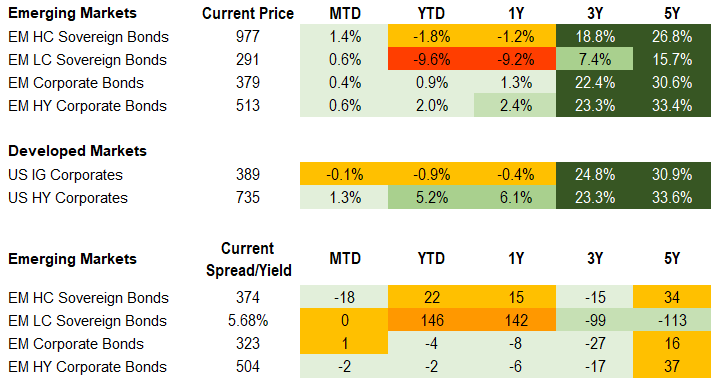
Equities
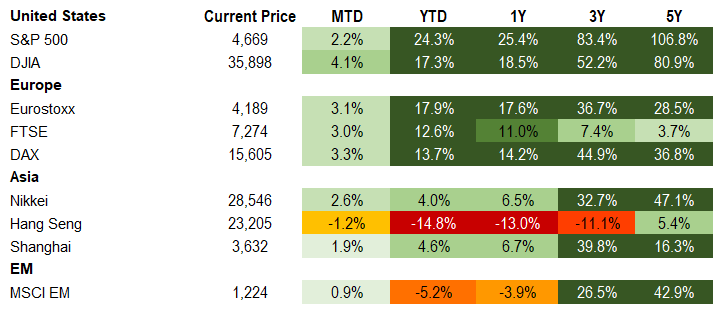
Commodities

Source for data tables: Bloomberg, JPMorgan, Gramercy. EM Fixed Income is represented by the following JPMorgan Indicies: EMBI Global, GBI-EM Global Diversified, CEMBI Broad Diversified and CEMBI Broad High Yield. DM Fixed Income is represented by the JPMorgan JULI Total Return Index and Domestic High Yield Index. Fixed Income, Equity and Commodity data is as of December 17, 2021 (mid-afternoon).
Emerging Markets Weekly Highlights
The Central Bank of the Republic of Turkey (CBRT) signals a pause in the easing cycle, but outlook on monetary policy remains clouded; inflation likely to accelerate in coming months on pass-through effects from historic TRY depreciation
Event: CBRT delivered another 100 bps policy rate cut to 14.0% on Thursday, taking cumulative monetary easing to 500 bps since September. Concurrently, President Erdogan announced a 50% hike to the minimum wage for public employees and approved a capital injection for state-owned banks.
Gramercy Commentary: In its communique following the decision, CBRT said that the cumulative impact of its recent policy actions will be monitored in the first quarter of 2022 and during this period, all aspects of the policy framework will be “reassessed”. We do not think this language signals a policy reversal toward tighter monetary policy in the near future, but rather a pause in easing while the authorities ponder their next moves in the context of evolving global financial conditions and the 2023 election cycle lurking around the corner. Meanwhile, the aggressive 50% increase in the minimum wages for public workers and capital injections for state-owned banks is a harbinger of the expansionary fiscal policy that we expect to dominate 2022 as President Erdogan’s Administration positions for the elections. 2022 is a pre-election year that comes against what is likely to be a very challenging backdrop for the ruling coalition: record low popularity, unanchored inflation and a currency that has depreciated by 125% since February. This is a socio-economic context that will be increasingly difficult to manage for the current administration in our view, hurting President Erdogan’s re-election chances, regardless of the forms and trajectory economic policy might take throughout next year. As such, we remain cautious and prefer to be positioned for further volatility in the near-term, but see improving odds of credit-positive political developments over the medium-term.
Argentina’s IMF negotiations progress, sequential inflation eases, and rate hikes under debate
Event: Last week, the IMF published a statement characterizing recent technical discussions with the Argentine government, which included further progress towards a macroeconomic plan and program, but fell short of a staff level agreement. The Fund continued to emphasize a generally unified view on the need for gradual fiscal improvement, export and FDI supportive policies, and a multi-pronged approach to tackle inflation. Meanwhile, November CPI eased to 2.5% m/m from 3.5% the prior month and the central bank is reportedly considering rate hikes in the backdrop of an uncertain external environment.
Gramercy Commentary: The recent events are incrementally supportive for an ultimate deal between the Fund and Argentina. While the better inflation data is largely a function of distortive price controls and measures adopted for electoral purposes, prospects for more orthodox interest rate policy is promising. The 2022 budget assumptions under debate in Congress will likely need to be tightened for program criteria. With political headwinds still present, this leaves room for volatility around the ultimate timing and execution of an agreement. Our view remains that the authorities will be able to agree to a stop-gap program which will provide some modest upside to asset prices as regime change momentum builds.
Outcome of presidential elections runoff on Sunday critical for Chile’s medium-term macroeconomic framework and market sentiment
Event: Chilean voters will elect their next president on Sunday between leftist candidate Gabriel Boric and his conservative opponent Jose Antonio Kast in a tight race in which Boric appears to have a slight edge.
Gramercy Commentary: The two candidates espouse very different visions on Chile’s appropriate political, social and economic direction, which makes Sunday’s runoff outcome particularly important and binary from a market perspective. Boric, a progressive left-wing politician, has advocated for a higher involvement by the state in Chile’s traditionally liberal market economy. At the opposite end of the spectrum, Kast has been described as a deeply conservative right-wing populist. In a clash of two very different ideologies, the elections’ outcome will drive the general direction of economic policy in Chile over the medium-term, and, by extension, investor sentiment. The prospect of a significant shift to the left in the government’s economic agenda under Boric has battered Chilean assets throughout 2021 and we expect pressure to continue if he emerges victorious on Sunday. A relatively “centrist” Congress should provide some level of comfort that economic policy initiatives, which markets may perceive as being “extreme”, are less likely to gain traction. However, we still think that a Boric Presidency will be seen as a credit-negative development by investors, especially in a post-pandemic world in which demands for better public services and addressing economic inequality, an acute problem in Chilean society, are likely to grow stronger. In the alternative scenario, although seen as less disruptive by markets, a Kast Administration is likely to face significant political and social obstacles in its quest to implement a deeply conservative agenda in a society demanding change toward more progressive values. Reflecting such underlying structural trends, Chile’s Constitutional Convention in charge of drafting a new Constitution might also redefine the overall political, social, and economic landscape quite meaningfully. As such, we think that political risks and noise are likely to remain high as we head into 2022, which means that markets will likely continue to cope with elevated uncertainty in the near-term. We will be paying particular attention on the cabinet composition as well as signals on whether the incoming president, once elected, would be willing to move toward the center on key policy issues.
Global emerging markets corporates in focus: The potential perils and possibilities of populism
Event: 2022 will be another busy year for elections with countries including Brazil and the Philippines going to the polls. Turkey is scheduled to vote in 2023. Ahead of these events, government actions which may impact voting decisions may also have implications for emerging markets corporates.
Gramercy Commentary: Wage increases and tax cuts for individuals may be considered by some administrations. This may be a positive for asset quality and loan growth at banks, given the implications for disposable income. It may also be positive for revenue growth at corporates providing consumer goods and services. Such actions can help bolster housing markets too. Administrations have also been known to consider special taxes on sectors ranging from financial services to extractive industries. These taxes can help fund costs incurred elsewhere but may impact bottom-line profitability and shareholders’ returns in the affected industries. Regulation may also increase in sectors including utilities and banking. For utilities, this may mean that higher input prices faced may not be passed on to end-consumers. Margins could come under pressure as a result. Some administrations could choose to leave pandemic-related measures in place for even longer. Such measures have included support for SMEs and regulatory forbearance for banks. If left in place, regulatory forbearance may continue to mask the impact of the COVID-19 pandemic on banks’ asset quality, capital and other metrics; though many lenders have also continued to disclose what those metrics would be without changes in regulations. Added to all this, there may be more implicit and explicit support for state-owned enterprises, many of which are issuers in the international bond markets. To the extent that such support not only serves government objectives but also boosts liquidity at these enterprises, they may be seen as a marginal positive. However, it is worth noting that such support often comes with strings attached. The busy election calendar may lead to increased volatility and may present opportunities in the corporate bond market. Such opportunities may be better captured in active-managed portfolios.
Emerging Markets Technicals
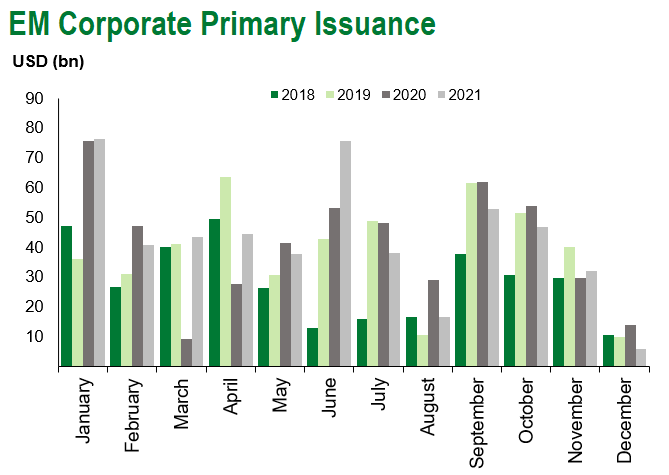
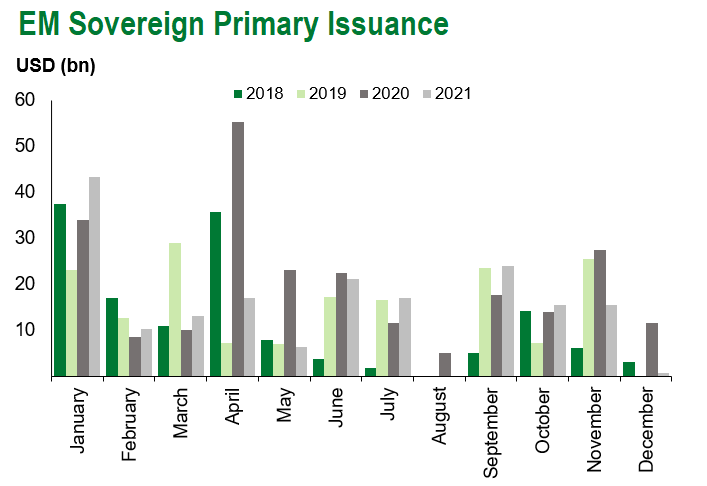
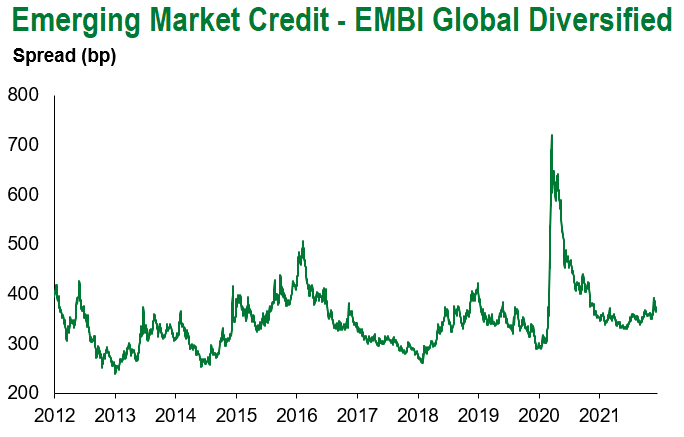
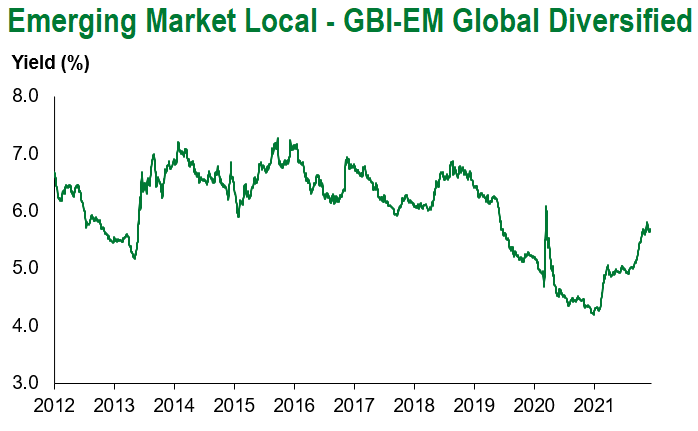
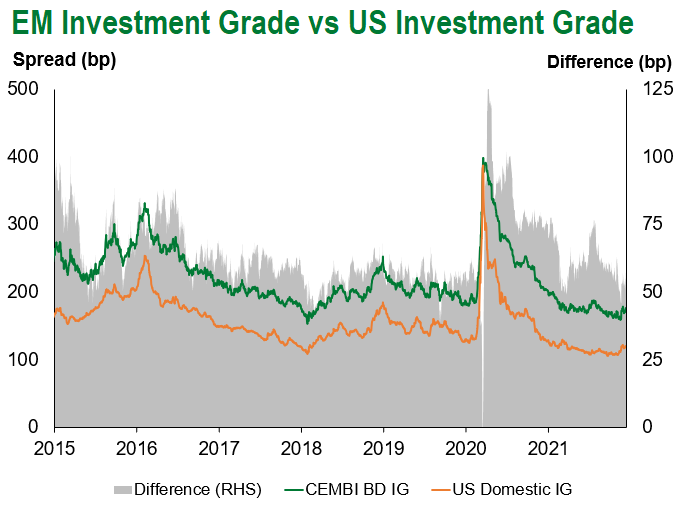
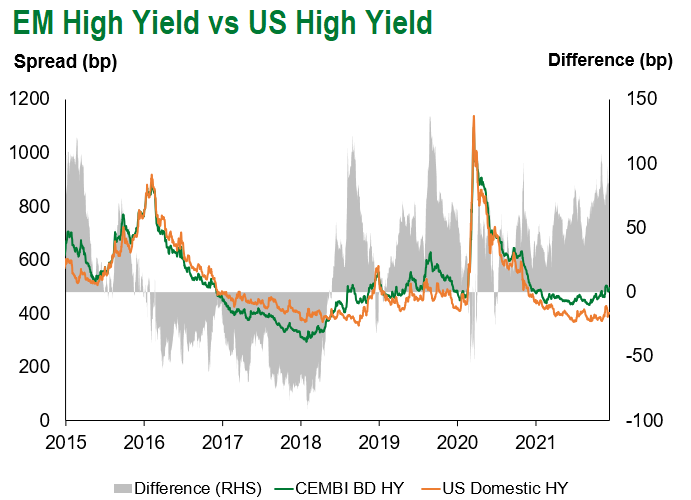
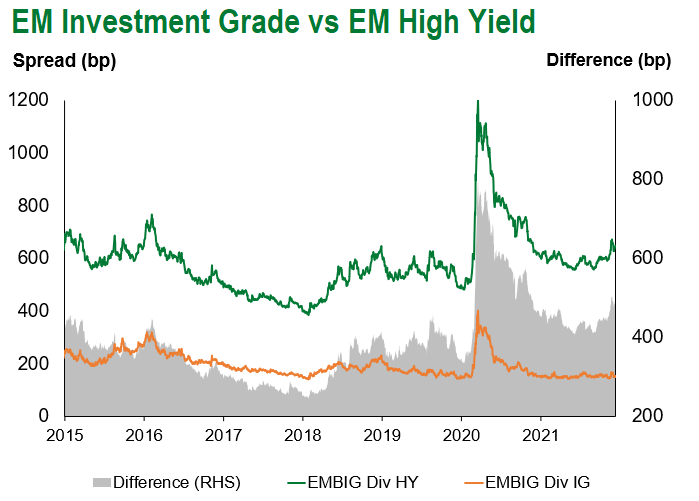
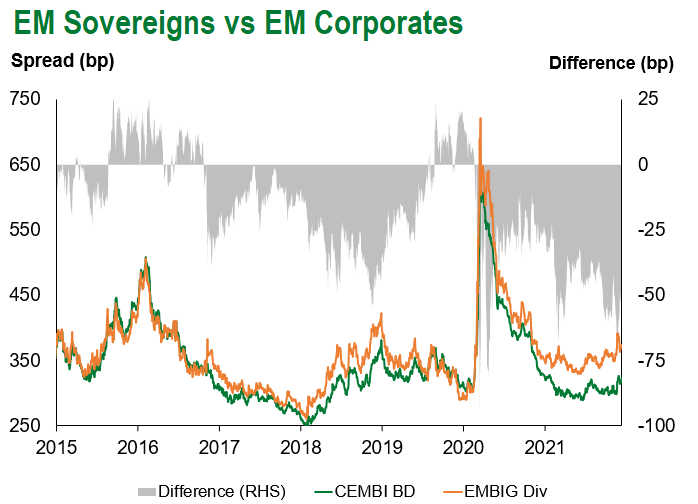
Emerging Markets Flows
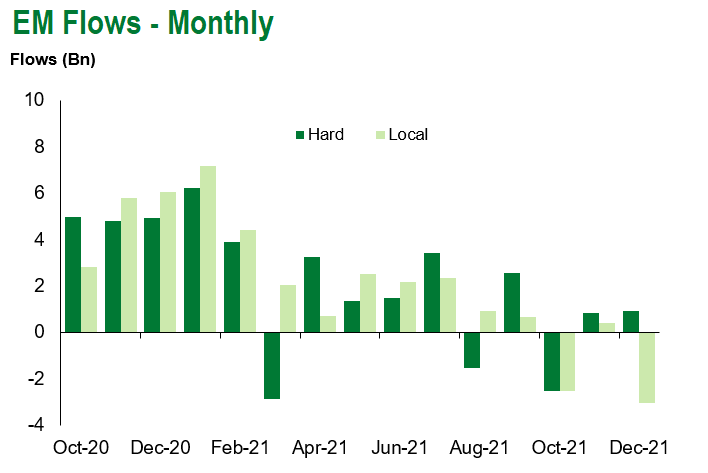
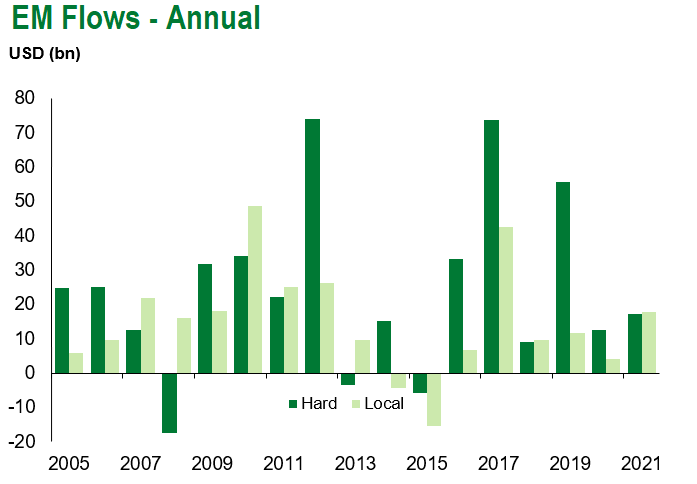
Source for graphs: Bloomberg, JPMorgan, Gramercy. As of December 17, 2021.
COVID Resources
Emerging Markets COVID-19 Case Summary
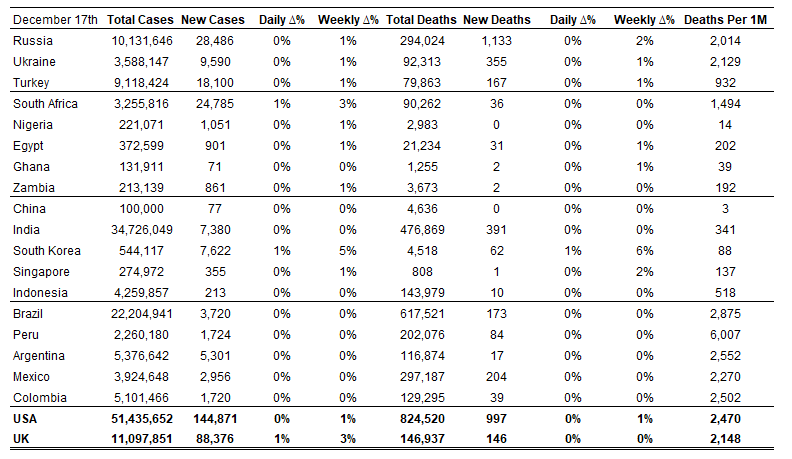
Source: Worldometer as of December 17, 2021.
Additional Crisis Resources:
Johns Hopkins COVID-19 Case Tracker
For questions, please contact:
Kathryn Exum, CFA ESG, Senior Vice President, Sovereign Research Analyst, [email protected]
Petar Atanasov, Senior Vice President, Sovereign Research Analyst, [email protected]
Tolu Alamutu, CFA, Senior Vice President, Corporate Research Analyst, [email protected]
James Barry, Vice President, Corporate Research Analyst, [email protected]
This document is for informational purposes only. The information presented is not intended to be relied upon as a forecast, research or investment advice, and is not a recommendation, offer or solicitation to buy or sell any securities or to adopt any investment strategy. Gramercy may have current investment positions in the securities or sovereigns mentioned above. The information and opinions contained in this paper are as of the date of initial publication, derived from proprietary and nonproprietary sources deemed by Gramercy to be reliable, are not necessarily all-inclusive and are not guaranteed as to accuracy. This paper may contain “forward-looking” information that is not purely historical in nature. Such information may include, among other things, projections and forecasts. There is no guarantee that any forecasts made will come to pass. Reliance upon information in this paper is at the sole discretion of the reader. You should not rely on this presentation as the basis upon which to make an investment decision. Investment involves risk. There can be no assurance that investment objectives will be achieved. Investors must be prepared to bear the risk of a total loss of their investment. These risks are often heightened for investments in emerging/developing markets or smaller capital markets. International investing involves risks, including risks related to foreign currency, limited liquidity, less government regulation, and the possibility of substantial volatility due to adverse political, economic or other developments. The information provided herein is neither tax nor legal advice. Investors should speak to their tax professional for specific information regarding their tax situation.